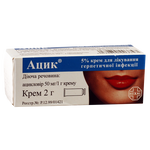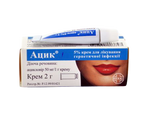ACIC CREAM 5%
-
International Name: ACYCLOVIR
- Pharmacological Group - Antiviral drugs for external use
-
Manufacturer: Saluta Pharma
- Country: Germany
- Issuance form: Group III over-the-counter
Pharmacological properties
Acyclovir is an antiviral drug that is a synthetic analog of the nucleoside purine group. It is characterized by the inhibition of the human herpesvirus in vitro and in vivo, including the Herpes simplex (HSV) type 1 and 2 virus, it is active against Varicella zoster (VZV) and Epstein-Barr (RBV) viruses. In cell culture, acyclovir is characterized by well-expressed antiviral activity against HSV-1, -HSV-2, VZV, EBV and CMV viruses. Thymidine kinase of cells infected with HSV, VZV, and EBV viruses converts acyclovir into an acyclovir monophosphate-nucleoside analog, which is subsequently transformed into diphosphate and triphosphate by cell enzymes. Inclusion of acyclovir triphosphate in the viral DNA strand and subsequent cleavage of the strand causes blockade of viral DNA replication. Prolonged and repeated treatment with acyclovir in patients with severe immunodeficiency leads to the development of resistant strains, which makes further treatment with the drug ineffective. In vitro aciclovir, HSV virus strains also cause the development of resistant strains. No correlation has been established in vitro between HSV susceptible strains to aciclovir and the clinical efficacy of the drug.
Pharmacokinetics:
Absorption and distribution: Acyclovir is only partially absorbed from the gastrointestinal tract. The mean peak steady-state drug concentration (Cmax) is 4.1 μmol (0.7 μg / μl) and the mean stationary minimum concentration (Cmin) is 1.8 μmol (0.4 μg / ml) every 4 h after oral administration. At 400 and 800 mg acyclovir every 4 hours, Cmax is 5.3 μmol (1.2 μg / ml) and 8 μmol (1.8 μl / ml), respectively Cmin 2.7 μmol (0.6 μl / ml) and 4 μmol (0.9 μl / ml). The concentration of acyclovir in the cerebrospinal fluid is 50% of its concentration in the blood. When taking 1 g of the drug orally per day, its concentration in breast milk is 0.6-4.1 of the concentration in blood plasma. At this time the baby enters the baby with breast milk at a concentration of 0.3 mg/kg/day. Acyclovir binds insignificantly (933%) to plasma proteins. Metabolism: The major metabolite of acyclovir is 9-carboxy methoxymethyl guanine. Excretion: The rate of excretion of the drug from the body decreases with age, and the half-life of the active substance increases slightly. The average elimination half-life of the drug in chronic renal failure is 19.5 hours, and in hemodialysis - 5.7 hours.
Methods and dosage
In the treatment of infections caused by herpes simplex type 1 and 2 viruses in adults, it is recommended to take 200 mg of acyclovir 5 times a day every 4 hours. The course of treatment is usually 5 days, but in severe primary infections, it is possible to continue it. In case of severe immunodeficiency (including bone marrow transplantation or intestinal absorption of the drug) 400 mg 5 times a day as prescribed. It is recommended to start treatment as soon as possible after the onset of infection. To prevent exacerbation of recurrent infections caused by herpes simplex viruses type 1 and 2, patients with normal immune status are prescribed 200 mg 4 times daily every 6 hours, or 400 mg 2 times daily every 12 hours. In some cases, acyclovir is effective in relatively low doses of 200 mg 3 times a day every 8 hours. Or 2 times a day every 12 hours. In case of recurrence, the drug is recommended in the prodromal period or as soon as the first signs of rash appear. In some patients, a clinically significant infection may develop after taking aciclovir 800 mg daily. Periodic discontinuation of acyclovir treatment is required every 6-12 months to detect possible changes in the course of the disease. Prevention of infections caused by herpes simplex type 1 and 2 viruses Patients with immunodeficiency are prescribed 200 mg 4 times a day every 6 hours. In severe immunodeficiency (including bone marrow transplantation or impaired intestinal absorption of the drug) it is possible to increase the dose of acyclovir to 400 mg 5 times a day. Treatment of infections caused by varicella-zoster -800 mg 5 times a day every 4 hours. The course of treatment is 7 days. Children 2 years of age and older are prescribed acyclovir orally in the same doses as adults. Children under 2 years of age - half the adult dose. During chickenpox, children over 6 years of age are prescribed 800 mg of acyclovir 4 times a day; 2-6 years of age -400 mg 4 times a day; Children under 2 years of age 200 mg 4 times a day. In case of severe immunodeficiency in the complex treatment, adults are prescribed 800 mg 4 times a day every 6 hours. The maximum course of treatment in recipients with bone marrow transplantation is 6 months (1 to 7 months after transplantation). The duration of treatment with acyclovir in patients with AIDS virus infection is 12 months. Patients with renal insufficiency with an oral creatinine clearance of less than 10 ml/min are prescribed 200 mg twice daily every 12 hours. In patients with chickenpox, herpes zoster, as well as patients with severe immunodeficiency, it is recommended in the following doses: creatinine clearance (less than 10 ml/min) -800 mg 2 times a day every 12 hours. Creatinine clearance 10-25ml / min -800mg 3 times daily every 8 hours;Creatinine clearance 10-25ml / min -800mg 3 times daily every 8 hours;Creatinine clearance 10-25ml / min -800mg 3 times daily every 8 hours;
Side effects
On the part of the gastrointestinal tract and liver: Rare - Moderate short-term increase in hepatic transaminase activity and bilirubin levels. In some cases - nausea, vomiting, diarrhea, intestinal colic, flatulence, abdominal pain. On the part of the CNS: rarely - headache, general weakness, in some cases - dizziness, memory impairment, hallucinations, drowsiness and seizures. Blood picture on hand: Rarely minor changes in hematological parameters. Dermatological reactions: skin rash that passes soon after discontinuation of the drug, diffuse alopecia.
Contraindications
Hypersensitivity to acyclovir or any of its components.
Pregnancy and lactation
No data are available on clinical trials of the drug in pregnant women. The drug is prescribed to pregnant women only in exceptional cases when the potential benefit to the mother outweighs the potential risk of adverse effects on the fetus. When taken orally, acyclovir is excreted in breast milk, so breastfeeding should be discontinued during lactation.
Special instructions
The effect of acyclovir treatment depends on the condition of the body's immune system. The drug is highly effective in patients with irreversible immunity. In patients with immunodeficiency, the formation of acyclovir-resistant viruses occurs after multiple courses of treatment. In patients taking antiretroviral drugs (zidovudine) orally, supplementation with aciclovir does not significantly increase the toxic effects. In elderly patients with high doses of acyclovir orally, large amounts of fluid are required. Elderly patients with impaired renal function are prescribed acyclovir in relatively low doses. The safety and efficacy of aciclovir in children with normal immunity have not been established.
Special instructions
Data on acute overdose of acyclovir have been poorly studied in humans. Systemic monitoring of the patient's condition is required when taking aciclovir 5 g orally. It is eliminated from the body through hemodialysis.
Interaction with other medicinal products: In combination with acyclovir and zidovudine in infections caused by the AIDS virus, the pharmacokinetics of these drugs do not change. After taking 1 g of probenecid for 1 hour after taking acyclovir, there is an increase in its half-life of 18% and an increase in the area of the concentration-time curve (AUС) by 40%.
Storage conditions: Store at room temperature, out of reach of children.
Conditions of release: Out of prescription.




